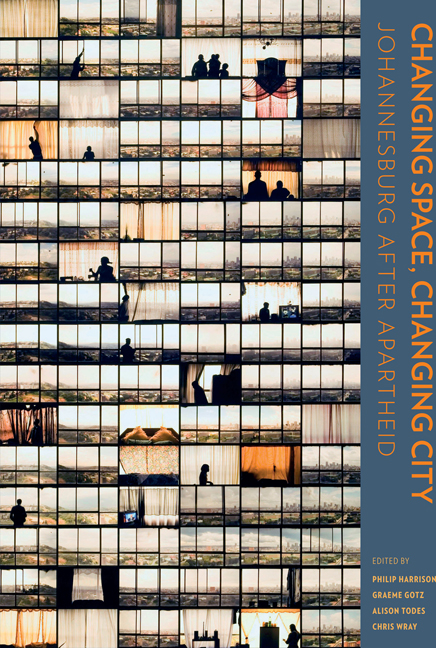Book contents
- Frontmatter
- Contents
- Preface
- Cartography
- 1 Materialities, subjectivities and spatial transformation in Johannesburg
- Section A The macro trends
- Section B Area-based transformations
- 12 Between fixity and flux: Grappling with transience and permanence in the inner city
- 13 Are Johannesburg's peri-central neighbourhoods irremediably ‘fluid’? Local leadership and community building in Yeoville and Bertrams
- 14 The wrong side of the mining belt? Spatial transformations and identities in Johannesburg's southern suburbs
- 15 Soweto: A study in socio-spatial differentiation
- 16 Kliptown: Resilience and despair in the face of a hundred years of planning
- 17 Alexandra
- 18 Sandton Central, 1969–2013: From open veld to new CBD?
- 19 In the forest of transformation: Johannesburg's northern suburbs
- 20 The north-western edge
- 21 The 2010 World Cup and its legacy in the Ellis Park Precinct: Perceptions of local residents
- 22 Transformation through transportation: Some early impacts of Bus Rapid Transit in Orlando, Soweto
- Section C Spatial identities
- Contributors
- Photographic credits
- Acronyms
- List of plates
- List of figures
- List of tables
- Index
17 - Alexandra
from Section B - Area-based transformations
Published online by Cambridge University Press: 20 April 2018
- Frontmatter
- Contents
- Preface
- Cartography
- 1 Materialities, subjectivities and spatial transformation in Johannesburg
- Section A The macro trends
- Section B Area-based transformations
- 12 Between fixity and flux: Grappling with transience and permanence in the inner city
- 13 Are Johannesburg's peri-central neighbourhoods irremediably ‘fluid’? Local leadership and community building in Yeoville and Bertrams
- 14 The wrong side of the mining belt? Spatial transformations and identities in Johannesburg's southern suburbs
- 15 Soweto: A study in socio-spatial differentiation
- 16 Kliptown: Resilience and despair in the face of a hundred years of planning
- 17 Alexandra
- 18 Sandton Central, 1969–2013: From open veld to new CBD?
- 19 In the forest of transformation: Johannesburg's northern suburbs
- 20 The north-western edge
- 21 The 2010 World Cup and its legacy in the Ellis Park Precinct: Perceptions of local residents
- 22 Transformation through transportation: Some early impacts of Bus Rapid Transit in Orlando, Soweto
- Section C Spatial identities
- Contributors
- Photographic credits
- Acronyms
- List of plates
- List of figures
- List of tables
- Index
Summary
The Alexandra Renewal Project (ARP) was announced by President Thabo Mbeki in December 2001 as a massive state-led intervention to improve the quality of life of residents in Alexandra, Johannesburg (see Figure 17.1), and to transform the spatial form of this hundred-year-old township. The ARP has now been operational for over a decade and has attracted both accolades and criticism. On World Habitat Day, 2009, the ARP was awarded a United Nations’ Scroll of Honour with the following citation:
For helping thousands of poor people move into better homes and boosting health, water and electricity services.
This renewal project has seen some 7,000 families relocated from the banks of a polluted local river to better settlements. Urban greening was incorporated in the project which led to development of parks and recreation areas. The project also saw the development of new housing, new schools and the refurbishment of many facilities. New clinics improved access to healthcare; while 46,000 hygienic refuse bins have been distributed, drastically improving garbage collection. More than 70 percent of the residents now have access to water and sanitation and 88 percent have safe electricity, a major milestone in a place once referred to as ‘Dark City’.
The ARP submission to UN Habitat claimed that ‘the development of ARP over time has fundamentally transformed the physical, economic and social environment of Alexandra’. Within the township, the Alexandra Development Forum has wide-ranging representation from community groupings across the township and provides broad support for the ARP.
There are, however, bitter critics who claim that the ARP has failed. For example, the Marlboro South Industrial Organisation, which represents mainly white-owned industry on the northern edge of Alexandra, has set up a web page on the ‘ARP failure’. Within the township, the youth wing of the Alexandra Land and Property Owners Association (ALPOA) has demanded the disbanding of the ARP, a call endorsed by the chairman of ALPOA who described the ARP as having done ‘a shoddy job with the renewal of the township’. The Alexandra Vukuzenzele Crisis Committee, affiliated to the Anti-Privatisation Forum, has refused to join the Alexandra Development Forum and is deeply critical of the ARP, engaging in periodic protest action, including the unauthorised occupation of houses.
Faced with these opposing views, the compelling question is whether the ARP has failed or succeeded in its objective to transform Alexandra.
- Type
- Chapter
- Information
- Changing Space, Changing CityJohannesburg after apartheid, pp. 342 - 369Publisher: Wits University PressPrint publication year: 2014



